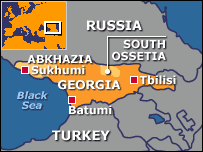BBC
Situated at the strategically important crossroads where Europe meets Asia, Georgia has a unique and ancient cultural heritage, famous traditions of hospitality and cuisine and an alphabet which is entirely its own. It also has a history of winemaking said to date back thousands of years.
Over the centuries, Georgia has been the object of rivalry between Persia, Turkey and Russia, and was eventually annexed by Russia in the 19th century. In recent years Moscow's key rival has been Washington.
The USA has a major interest in security and stability in the country, having invested heavily in an oil pipeline which will carry oil from Azerbaijan via Georgia to Turkey. The Georgian armed forces have been receiving US training and support. Increasing US economic and political influence in the country is being watched closely by the Kremlin.
Georgia enjoyed an interlude of independence after the 1917 Bolshevik revolution in Russia but was invaded by the Soviet Red Army in 1921 and incorporated into the Soviet Union a year later.
Following the collapse of Communism in the USSR in 1991, Georgians voted overwhelmingly for the restoration of independence and elected nationalist leader Zviad Gamsakhurdia as president. However, Gamsakhurdia was soon overthrown by opposition militias which in 1992 installed former Soviet Foreign Minister Eduard Shevardnadze as the country's new leader.
Once a relatively affluent part of the Soviet Union, the loss of cheap Soviet energy and the rupturing of trading ties caused the economy to nose-dive. Despite a recent improvement, the republic remains among the poorest countries of the former USSR and is still dependent on Russia for its energy supply.
Since independence, the people of Georgia have endured periods of civil war and unrest as well as violence related to the independence aspirations of the breakaway regions of Abkhazia and South Ossetia. Although diplomatic efforts have brought relative stability in recent years, tensions over both regions persist.
Georgia shares a border with Russia's troubled Chechen Republic and there have been angry exchanges between the two countries over Russian allegations that Chechen rebel fighters are allowed to enjoy a safe haven high in the remote Georgian Caucasus mountains.
Despite repeated official promises to stamp out crime and corruption, the country continues to be ravaged by both. Recent years have seen institutional, legal and economic reforms, but many of the achievements have been undermined by corrupt practices.
GEORGIA FACTS Population: 5 million
Capital: Tbilisi
Major languages: Georgian, Russian
Major religion: Christianity
Life expectancy: 69 years (men), 76 years (women)
Monetary unit: 1 lari = 100 tetri
Main exports: Scrap metal, wine, fruit
Average annual income: US $590
Internet domain: .ge
International dialling code: +995
Outgoing President: Eduard Shevardnadze
One of the world's longest-standing political survivors, Mr Shevardnadze resigned on 23 November 2003 after facing his sternest challenge in the political chaos that followed parliamentary elections earlier in the month.
Official results gave the government a victory. But the elections were condemned by international observers who said they had witnessed "spectacular" irregularities.
Mass demonstrations followed, at which protesters called on Mr Shevardnadze to resign. Opposition supporters seized the chamber during the first session of the new parliament.
Mr Shevardnadze joined the Communist Party in 1946 and rose through the party ranks to become Georgia's Communist leader in 1972.
As Soviet foreign minister between 1985 and 1990 when the Cold War began to thaw, he oversaw a transformation in Soviet foreign policy. That has not been forgotten in international diplomatic circles.
When Zviad Gamsakhurdia, Georgia's first post-independence leader, was deposed in 1992, Mr Shevardnadze was first installed and then elected as leader of independent Georgia. He has been the dominating figure in Georgian political life ever since. Mr Shevardnadze was elected president in 1995 and re-elected in 2000.
Over the years, he made many pledges to root out the corruption which is widely seen as the country's most crippling problem. However, it remains endemic.
Born in 1928, Mr Shevardnadze has faced two apparent attempts on his life, one in 1995 and the other in 1998.
Chair of parliament: Nino Burjanadze
Minister of state: Avtandil Jorbenadze
Foreign minister: Irakli Menagharishvili
Much of the Georgian media are considered to be free, and journalists regularly criticise officials and their conduct.
In 2003 the media rights organisation Reporters Without Borders said journalists investigating corruption continued to be harrassed, and sometimes physically attacked. The outspoken private TV station Rustavi-2 has regularly aroused the ire of police and officials.
The authorities finance some publications and operate the national state TV and radio networks. There are some 200 privately-owned newspapers.
The pressSakartvelos Respublika - state-owned
Alia - private
Rezonansi - private
Georgian Times - English-language
Svobodnaya Gruzia - Russian-language
Archive of Georgian newspapersTelevisionGeorgian State TV Rustavi-2 - private
Imedi TV - private
Ajara TV - state-run channel in autonomous republic of Ajaria
RadioGeorgian State Radio Fortuna - private, Tbilisi FM station
Radio 105 - private, Tbilisi FM station
News agenciesSakinform - state-run
Prime-News - private
Iprinda - private
Kavkasia-Press - private
